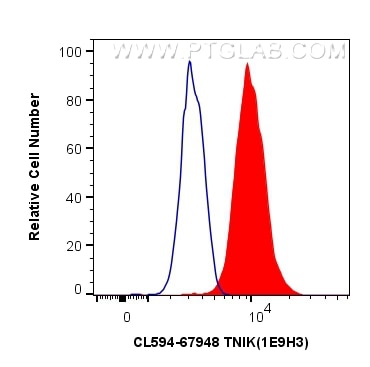Anticorps Monoclonal anti-TNIK
TNIK Monoclonal Antibody for FC (Intra)
Hôte / Isotype
Mouse / IgG2a
Réactivité testée
Humain
Applications
FC (Intra)
Conjugaison
CoraLite®594 Fluorescent Dye
CloneNo.
1E9H3
N° de cat : CL594-67948
Synonymes
Galerie de données de validation
Applications testées
| Résultats positifs en cytométrie | cellules A431 |
Dilution recommandée
| Application | Dilution |
|---|---|
| Flow Cytometry (FC) | FC : 0.80 ug per 10^6 cells in a 100 µl suspension |
| It is recommended that this reagent should be titrated in each testing system to obtain optimal results. | |
| Sample-dependent, check data in validation data gallery | |
Informations sur le produit
CL594-67948 cible TNIK dans les applications de FC (Intra) et montre une réactivité avec des échantillons Humain
| Réactivité | Humain |
| Hôte / Isotype | Mouse / IgG2a |
| Clonalité | Monoclonal |
| Type | Anticorps |
| Immunogène | TNIK Protéine recombinante Ag30710 |
| Nom complet | TRAF2 and NCK interacting kinase |
| Masse moléculaire calculée | 155 kDa |
| Numéro d’acquisition GenBank | BC055427 |
| Symbole du gène | TNIK |
| Identification du gène (NCBI) | 23043 |
| Conjugaison | CoraLite®594 Fluorescent Dye |
| Excitation/Emission maxima wavelengths | 588 nm / 604 nm |
| Forme | Liquide |
| Méthode de purification | Purification par protéine A |
| Tampon de stockage | PBS avec glycérol à 50 %, Proclin300 à 0,05 % et BSA à 0,5 %, pH 7,3. |
| Conditions de stockage | Stocker à -20 °C. Éviter toute exposition à la lumière. Stable pendant un an après l'expédition. L'aliquotage n'est pas nécessaire pour le stockage à -20oC Les 20ul contiennent 0,1% de BSA. |
Informations générales
Traf2- and Nck-interacting kinase (TNIK) is one of the germinal center kinase family members involved in cytoskeleton organization and neuronal dendrite extension (PMID: 24566388). TNIK is an essential regulatory component of the T-cell factor-4 and β-catenin transcriptional complex and is required for the tumor-initiating function of colorectal cancer stem cells (PMID: 10521462).
Protocole
| Product Specific Protocols | |
|---|---|
| FC protocol for CL594 TNIK antibody CL594-67948 | Download protocol |
| Standard Protocols | |
|---|---|
| Click here to view our Standard Protocols |


